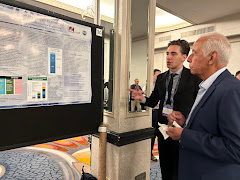The American Association of Community Colleges (AACC) hosts
the annual National Science Foundation (NSF) Advanced Technological Education
(ATE) Centers’ conference in Washington, D.C. NSF ATE grantees and their
project partners attended this year’s conference on October 23-25, 2024 which focused
on critical issues related to advanced technological education. FLATE was one
of the more than 850 conference participants that represented community
colleges, businesses and industry, secondary school systems, and four-year colleges
offering projects ranging from information technology, engineering technology,
micro and nanotechnologies, chemical technology, and biotechnology. [without
the ‘more than 850’ here, it sounds like FLATE represents all those areas]
For several years FLATE has actively participated at the ATE
PI Conference. This year, FLATE and several of our partners presented together
in multiple conference and pre-conference workshops, sessions and exhibits. Dr. Marilyn Barger, Senior Education Advisor
for FLATE, co-led two pre-conference workshops on these projects:
- The “Working Partners” project on
industry partnerships and related strategies and best practices for discovering
and deepening relationships.
- “Needed
Math”, a project led by Hofstra University in NY, to investigate the
mathematics truly needed by manufacturing technicians in the workplace.
There was robust attendance in each session with 30
educators and three industry representatives attending the first session, and
45 educators and four industry representatives attending the latter session.
ATE Conference Sessions
As part of the
Innovation Demo session, Dr. Barger presented
information on the
Hidden Innovation Infrastructure project, an applied
research initiative spearheaded by Rutgers University. The demo premised on “
Motivations,
Activities, and Outcomes of Economic Development” and targeted to expanding
understanding of the role of economic development in technician education and
the changing future of work. The presentation showcased
Hidden Innovation
Infrastructure project’s multi-faceted approach to conceptualizing and
examining the economic development role of community college technician
education and the ATE program in the context of the changing nature of work.
Dr. Barger also co-hosted an ET Pathways Synergy Session on
advanced manufacturing technologies with colleagues Sid Martin, Program Director
for Engineering Technology at St. Petersburg College, and Joe Veranese, Vice-President
and Chief Information Officer of the National Center for Defensive
Manufacturing and Machining. The goal behind the session was to explore
real-world examples of how Artificial Intelligence (AI) and Machine Learning
(ML) are used in manufacturing, to identify specific technician skills needed
to implement AI/ML in industry settings, and how educators can enhance and/or
incorporate them into everyday curriculum.
During the conference, an
ATE Connects session featured
more than 220 projects and centers through “conversation hubs” organized by STEM
discipline area and offered ATE projects and centers dedicated time to work
with participants, explore the ATE community, and share resources. Dr. Marilyn
Barger, Dr. Richard Gilbert, Sid Martin from St. Petersburg College, and Mori
Toosi, Program Director for Engineering Technology at Polk State College exhibited
the "ET Pathways Connection Hub".
Click here to view the poster.Poster Sessions
As part of an effort to give students a real-world view of
changing technologies and showcase real-world applications of what they’re
learning in the classroom, every year FLATE sponsors students who are enrolled
in the two-year, A.S. ET degree at a state/community college in Florida to
attend the ATE Conference. The effort also provides a
bigger view of NSF’s engagement in technician education. This year FLATE
sponsored four students: Spencer Love and Jacob Inglese from St. Petersburg
College and Michael Amey and Mike Hardy from the College of Central Florida. The students participated in poster sessions over
multiple days during the Conference to highlight their program of study and/or
career path.

Jacob Inglese’s poster presentation was centered on the hydrogen
economy. With applications ranging from space to the depths of the ocean,
hydrogen offers key solutions for heat, electricity, combustion, and lightweighting.
The poster also explored hydrogen’s role in decarbonizing industry as a
versatile and sustainable fuel and in positioning hydrogen as a crucial player
in clean energy transition. Jacob is immensely grateful for the support of the NSF
and sponsors like FLATE and SPC, who gave him an “incredibly rewarding” opportunity
to present his research findings on a STEM topic of his choice as well as
discuss questions about hydrogen, a subject Jacob is “deeply passionate” about.
“These interactions taught me valuable insights on how to better navigate
today’s job market,” Jacob said.
Spencer Love’s poster highlighted rapid prototyping in
manufacturing and its benefits impacting methods, materials,
cost-effectiveness, and efficiency. “This conference broadened my view of
the manufacturing industry” and provided an opportunity to “connect with
like-minded individuals who strive to do their best” Spencer said.
Michael Arney and Mike Hardy’s presentation was on advanced
manufacturing with robotics and programmable logic controllers (PLCs). Automation
processes and PLCs are the backbone of the manufacturing industry and help
streamline processes in thousands of industries across the world today. Their
poster provided a unique look at advanced manufacturing technology starting
with robotics and PLCs.
In addition to the sessions/presentations, the conference
was ideal for “connecting and collaborating” with industry colleagues, recognizing
them for their contributions to advancing technician education and training, and
learning about emerging technologies across a variety of STEM disciplines. Mark
your calendar for the 2025 ATE Conference from October 29-31. For more information
on how to “Connect, Collaborate and Innovate” with FLATE and/or with the
larger NSF ATE Community contact Dr. Marilyn Barger at barger@fl-ate.org, or visit fl-ate.org and https://www.atepiconference.com.






No comments :
Post a Comment